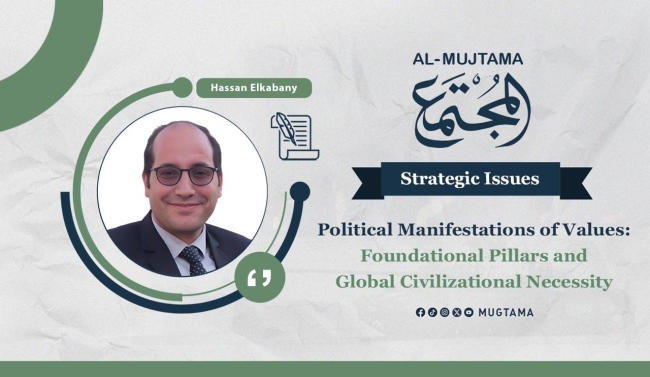Political Manifestations of Values: Foundational Pillars and Global Civilizational Necessity Featured
The political manifestations of core values, including freedom, justice, equality, consultation, mercy, and anti-corruption, serve as foundational pillars for any desired political reform in Arab and Islamic countries. They are a civilizational necessity for the Islamic nation to regain its leadership, according to intellectuals interviewed by 'Al-Mujtama' magazine.
"Major Islamic political values were conceived but never brought to life," says Egyptian philosopher and former member of the National Justice Committee of the Egyptian Cabinet following the January 25, 2011 revolution. This statement, attributed to the renowned philosopher Muhammad Iqbal, is cited by Yasser Al-Gharbawi, an Egyptian thinker and academic, in his assessment of the current state of Islamic civilizational values in contemporary political reality.
Dr. Al-Gharbawi: Reviving the Nation's Civilizational Cycle Requires Political Reform Based on Values
Dr. Al-Gharbawi, who currently serves as the Director of the Diversity Center for Conflict Resolution, Peacebuilding, and Social Reconciliation, explains to "Al-Mujtama" that the philosopher Muhammad Iqbal meant that these values, foremost among them consultation (Shura), have been subjected to severe blows after the Prophet Muhammad, peace be upon him, and after the early Caliphate, leading to their complete disappearance. This resulted in the spread of despotism, oppression, criminalization of change, and negative impact on heritage and religious practices.
It is worth noting that Islamic civilization has been closely associated with justice as a foundational value, followed by mercy, as evidenced by the Quranic verses: "So that people may administer justice" (Surah Al-Hadid, 57:25) and "And We have not sent you, [O Muhammad], only as a mercy to the whole world" (Surah Al-Anbiya, 21:107). The Prophet Muhammad, peace be upon him, and his early companions embodied these values, which later receded, remaining only as mere rhetoric without positions of implementation, authority, or influence over people's lives.
Al-Gharbawi emphasizes that values such as consultation, justice, mercy, equality, and freedom are needed by Arab and Islamic countries now to help revive the civilizational cycle of the Islamic nation anew. Every civilization is built on a set of core values, and its success depends on activating these values. This can be achieved through a grassroots movement involving educators, scholars, preachers, and politicians who adopt these values, prioritize them, integrate them into daily life, and serve as models in their small communities. These value-based models can then gradually transition into the realms of politics, culture, and influence.
Bayoumi: The West benefited from our Islamic civilizational values, progressing contrary to Arabs and Muslims
Human Rights Pillars
On the other hand, human rights activist Khalaf Bayoumi, Director of the Shahab Centre for Human Rights, in his conversation with "Al-Mujtamaa," sees these Islamic civilizational values associated with political reform as essential pillars in global human rights projects, and a necessary tool for strengthening any system or state, and thus reforming the conditions of citizens and nations. He explains that the West has used the essence of these values in its governing system and human rights projects, achieving success through them, while Muslims and Arabs suffer from lagging behind in political progress and general reform due to their failure to appreciate this value system.
Bayoumi adds that the experience of the "Arab Spring" and its political aftermath has confirmed that the presence of these civilizational values in power, without bias from state institutions, obstructs progress, even if the forces adopting them receive strong popular support. This requires embedding these values in educational and nurturing institutions to ensure the adoption of a proper conduct in the minds of future generations, as well as a management and life approach in governance and decision-making institutions, away from electoral advantage holders.
Hussein: Politics Isn't Filthy... It Needs Values to Prevent It from Becoming a Tool for Corruption and DecayTop of Form
Yasser Sideek Hussein, the Egyptian politician, explains in his conversation with "Al-Mujtamaa" that any political framework lacking central values to govern it becomes vulnerable to the whims of a small group that possesses power and authority. This threatens the entire society and contributes to the spread of hypocrisy, corruption, and decay. However, in the presence of Islamic civilizational values, political action, when oriented towards reform, becomes a fruitful project governed by rules, incentives, and governing frameworks that propel progress and push nations away from paths of backwardness and underdevelopment.
Hussein points out that liberation from values in politics, as advocated by Machiavelli in his book "The Prince," under the slogan "the end justifies the means," is the most dangerous threat to any political reform project in any country. There must be an ethical and moral framework for politics and a reference point to govern it. He rejects what is said in some Egyptian circles that "politics is filthy," considering it a misconstrued saying that does not align with Islamic reference points. He emphasizes that the Prophet Muhammad (peace be upon him) is the perfect role model and presented an ideal image of how a politician should be, embodying the major governing values such as consultation, justice, mercy, equality, and freedom.
-------------------------------------------------------------


